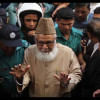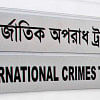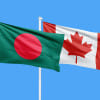Stay out of our affairs
Back in December 2013, the Pakistani foreign ministry and indeed, the Pakistan National Assembly and Punjab Provincial Assembly adopted a number of resolutions over the execution of war criminal Quader Mollah. Today, after the recent execution of two individuals who have been tried and found guilty by the international (war) crimes tribunal, Pakistan's foreign ministry has issued this highly objectionable statement stating "we have noted with deep concern and anguish the unfortunate executions…Pakistan is deeply disturbed at this development". This is a violation of diplomatic protocol.
Uttering such statements is an affront to Bangladesh which fought a bitter and violent war of liberation in 1971. Bangladesh ceased to be part of Pakistan on December 16, 1971 and hence Islamabad has no business making public statements on a subject which is, essentially, none of its business. What perplexes us is why it is going to all this trouble in the first place. As history will testify, members of Pakistani forces committed acts of atrocity during 1971. What is interesting to note is that the 195 Pakistanis were not freed without charges. As per an article printed in The Forum titled 'The Curious Case of the 195 War Criminals' in May 2010, by Syeed Ahamed, "Bangladesh, however, made it clear that India would not release 195 of the initially accused Pakistani POWs and Bangladesh would try them, along with its local collaborators, for war crimes." That plan fell through thanks to arm twisting by the Pakistani government which used the issue of stranded Bangladeshi officers and families.
Going by a statement issued by the Pakistani government at the latter part of April, 1973, "Pakistani government rejects the right of the authorities in Dacca to try any among the prisoners of war on criminal charges, because the alleged criminal acts were committed in a part of Pakistan by citizens of Pakistan. But Pakistan expresses its readiness to constitute a judicial tribunal of such character and composition as will inspire international confidence to try the persons charged with offences." To the best of our knowledge, there was no tribunal formed and the matter, in all probability, never came to light. What did come to light, however, was the fact that Pakistan decided to take hostage some 16,000 Bangladeshi civil servants after dismissing them from government jobs and many of them, including army officers, ended up in "concentration camps". This is corroborated by the International Rescue Committee (IRC) which reported that many Bangladeshi people were arrested on Pakistan soil for their "alleged intent to leave Pakistan".
The issuance of the highly objectionable statement by the Pakistani foreign ministry is provocative to say the least. Precisely what will be achieved by making derogatory remarks on the judicial process, that has allowed for Bangladesh to bring to a close the demand of a nation and its people who have sought for the better part of four decades redress for crimes committed against an unarmed people, is still unclear. If the intention is to draw international ire of human rights organisations, vis-à-vis nations that are categorically opposed to capital punishment, then it has succeeded. What has been lost in the process of course is whatever goodwill that existed between these two member states of SAARC.
As for: "There is need for reconciliation in Bangladesh in accordance with the spirit of Pakistan, India, Bangladesh Agreement of 9th Arpil, 1974. The Agreement calls for a forward looking approach in matters relating to 1971. This would foster goodwill and harmony", we beg to differ that the agreement did not absolve Pakistan of its promise to conduct a probe into allegations made by Bangladesh on the criminal activities of the 195 war criminals. There is no doubt that attempts have been made and are being made currently to portray the war crimes trial process as being "politically motivated" and "not living up to international standards". The reality is that had the process not been a fair one, the process would not have taken this long. Had we been witnesses to "kangaroo" courts, most, if not all, the accused would have been done away with, within a short period.
Going by what has been reported in Pakistani electronic media Geo TV (and printed in this paper), Pakistani Interior Minister Chaudhry Nisar Ali Khan has hinted that a "group" in Bangladesh is against restoration of friendly relations between the people of Pakistan and Bangladesh. Precisely how does the Pakistani government expect to restore friendly relations between the two countries? By making a mockery of our judicial system? By distorting history in the vain attempt that no one will take note of it? The atrocities committed by the Pakistani military and its cohorts against the people of Bangladesh have not disappeared from collective memory of Bangladeshis. The trials will continue regardless of what Pakistan thinks of them.
The writer is Assistant Editor, The Daily Star.

 For all latest news, follow The Daily Star's Google News channel.
For all latest news, follow The Daily Star's Google News channel. 








Comments